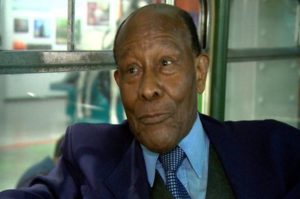Ringside Report Looks Back At Civil Rights Icon Roy Hackett (1928 – 2022)
 By Donald “Braveheart” Stewart
By Donald “Braveheart” Stewart
As I sit in my Kailyard I wonder often about the future.
Oftentimes heroes are thin on the ground, and they can slip away without us noticing. This past month we mourned the loss of a hero and a significant figure in the history of race relations in the United Kingdom. If Rosa Parks made her stance on a bus, Roy Hackett made a principled stance by driving them. And he was, as we say in Scotland, only yin o Jock Tamson’s Bairns…
This is a story never told in a school – at least not any in which I was educated. Our Trades Union movement has a long history in the United Kingdom of success in protecting the rights of workers and ensuring their safety and equity within a workplace. Without them as a check and balance to the unremitting drive for profit, ordinary people would be left with little to show for their efforts in helping those who have much more than them, to have even more.
Roy Hackett was a trades unionist who proved more than their worth to improve lot of their fellow man. He died on August 3rd of this year at the age of 93, and in the history of Britain his importance cannot be over-estimated. For Hackett, like Parks, challenged the prejudice of their time.
He called himself a “humble freedom fighter” but his role in the Bristol Bus Boycott is worthy of being shouted from the rooftops and included in every history book of that period. He was a part of the group who organized a campaign to overturn a ban, by the employers, the Bristol Omnibus Company, of refusing to employ black and Asian drivers and conductors. It is exactly the type of historical event which ought to be celebrated the length and breadth of the Kingdom.
Born in Jamaica, Hackett came to the UK as part of a colonial drive to attract people into the UK. Once here they experienced the type of racism that made them both feel unwelcome and wonder why they ever made the effort at all. In 1963, and in employment as a bus driver, Hackett experienced over racism as it was entirely legal and acceptable for British companies to racially discriminate. All the usual myths and lies we hear now about immigrants were acceptable commentary of the time and along with Paul Stephenson, Owen Henry and Guy Bailey, Hackett set about recruiting the ordinary citizens of Bristol to hit the company where it really hit them back – financially. The boycott was not just successful, it led to real change – legally, morally and practically. There is a direct correlation between the boycott and the Race Relations Acts of 1965 and 1968.
Hackett’s efforts meant that people got work, they earned their keep and got the dignity denied in the street by some but the respect they earned through honest and hardworking endeavor as well as well reasoned and well managed engagement with the general public improved more than their community – it improved everyone’s. Once ordinary people knew the effect of the color bar, they joined in to call for its end. It was democracy, true grass roots democracy in action.
But his work after the ending of the ban was not done. Like so many who saw injustice he understood its effect. You needed to do more than knockdown one of its skittles, you needed to build your own response and demolish all the skittles. In Bristol and beyond that meant he became involved in the creation of the St Paul’s Carnival in Bristol, the Bristol West Indian Parents and Friends Association and the Bristol Race Equality Council.
His early life, he described as a dog’s life as racism was rife. It is still evident today though it exists in more subtle formats. We may not have the need to boycott buses to show our solidarity, but we do need to keep the feet to the fire of an anti-racism movement that requires regular feeding – why? Because we truly are aw Jock Tamson’s Bairns.
A view from the new Kailyard or, how you look over there, from over here…
(Kailyard n. a cabbage patch, often attached to a school of writing – the Kailyard School – a genre of overly sentimental and sweet Scottish literature from the late 19th century where sentimental and nostalgic tales are told in escapist tales of fantasy, but here we seek to reverse it by making the Kailyard Observations of effective invective comment from that looks not to return to the past but to launch us into a better future by the one Donald worth believing…)
And today’s Scots word tae bamboozle ye…
Each time we see ye, we shall try tae leave ye wi a word o oors tae replace a word o thine. Jist fur the sake o learnin, ken!
Jock Tamson’s Bairns Jock Tamson’s bairns: the human race, common humanity; also, with less universal force, a group of people united by a common sentiment, interest or purpose.

